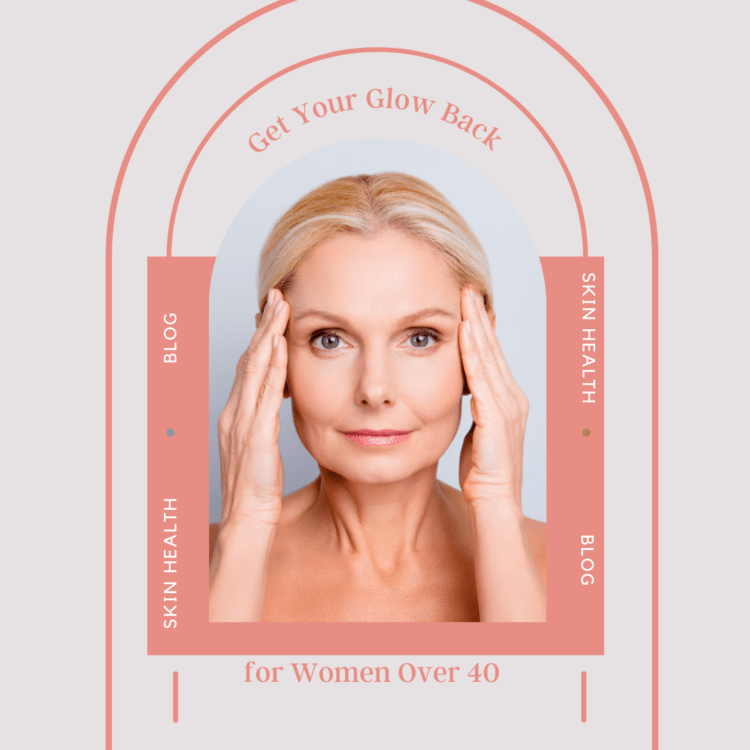Skin health changes along with your hormones in your 40s and 50s…
And getting your glow back can take a little bit of extra effort.
Like many parts of the body, your skin contains receptors for oestrogen.
As oestrogen declines during perimenopause, your skin may get thinner and become dryer and more sensitive.
Collagen which keeps skin supple and elastic also naturally declines with age.
Here are some of the other things which can adversely affect your skin
And contribute to accelerated ageing…
- Your diet – nutrient deficiencies, too much caffeine, sugar or alcohol
- Lack of hydration – not drinking enough water
- Gut and digestive issues – compromised gut health, an imbalance of beneficial bacteria in your gut, inadequate digestion, constipation, which can reduce the clearance of toxins. All of these issues can affect your skin and nutrient absorption.
- Stress – Stress hormones can affect the balance of oestrogens in relation to progesterone which can cause spots. Stress hormones can also increase the amount of sebum in your skin which can contribute to blocked pores
- Lack of sleep – Getting adequate quality sleep is a must for good skin, easier said than done for some in peri-menopause…
- Cleaning your skin (and your pillowcases) – harsh ingredients can aggravate your skin and damage its natural acid balance. Pillowcases, or anything you lay your face on, can also harbour bacteria.
- Hormone Pathways – The hormone testosterone, which women produce in much smaller amounts than men, can favour a biochemical pathway in some women which can increase inflammation and acne
- The sun – some sun is good for your skin. We need to be exposed to sunlight to get adequate Vitamin D. However, too much can be damaging
How to get your glow back
DIET
- Eat foods containing beta carotene (sweet potatoes, butternut squash, carrots, dark green leafy veg), vitamin C (kiwi, bell peppers, dark green leafy veg, organic strawberries) & vitamin E (avocado, sunflower seeds, almonds, pomegranate, papaya, asparagus sweet potato, broccoli and dark green leafy vegetables).
- Include foods rich in anthocyanidins (PCOs), a plant compound found in dark/purple-skinned fruits and vegetables such as red grapes, berries (blackberries, blueberries, blackcurrants), plums, pomegranates, aubergine, red onions, radish
- Eat omega-3 rich foods for moisturising your skin from the inside and to help reduce inflammation. Foods such as oily fish (sardines, mackerel) or a good quality fish oil or algae (if vegan) supplement.
- Adding bone broth to your cooking or taking collagen supplements may be helpful
- Limit sugar, sugary foods and foods that can affect your blood glucose levels such as caffeine and alcohol.
LIFESTYLE
- Manage stress and sleep. Focus on the things you can do to help get a good nights sleep. Click on the links for more information
- Reduce your toxic load – Look at where you can reduce toxins in your diet and lifestyle ie eating organic foods, cleaning and personal care products. And ensure that you have a daily bowel movement to remove toxins from your body. If your struggle with this, adding 2 tbsp of ground flaxseed to your daily diet can be helpful. A chlorella supplement may also be beneficial.
- Get your hormone health and gut health tested. Click on the links for further advice and info.
- Use gentle skincare cleaning and personal hygiene products – no harsh scrubs and peels, products including alcohol (check cleansers and toners), avoid sodium lauryl sulfate (SLS) which can strip your skin of its natural, protective layer.
- Use a good quality face and body moisturiser.
- Clean your pillowcase /anything you lay your head/face on regularly
- Get adequate fresh air and sunlight but if in the sun for extended periods wear a hat, cover up and use a sunscreen
- Consider taking a good quality multivitamin and mineral complex including active B vitamins. This could be the quickest way to address any nutrient deficiencies. Another supplement to consider is zinc citrate. Taking this alongside omega-3 fatty acids could be beneficial




